Most people love dogs. But, they also want to raise a flock of chickens in their backyard. They want to cherish not only these cool, farm-vibes but also devour on farm fresh eggs and meat with their family & friends! However, they’re always worried whether both two of their loves can get along or not? It’s a dog’s natural instinct to chase any small moving creature, particularly cats, squirrels, & birds. Therefore, most new chicken breeders are concerned about if their dogs will get along with their chickens. Since most dog breeds have a low prey drive, they won’t ever harm your chickens. In this article, we will outline some of the best farm dogs for chickens and give you an opportunity to make an educated decision.
Image Source: Unsplash
Is your farm dog good with chickens?
If you’re going to raise chickens in your backyard, you need to consider a dog breed that will not harm or kill your chickens. This is because chickens make enticing prey for most canines. Every dog breed exhibits particular traits that define its attitude towards chickens, like low prey drive & chicken friendliness. These traits can help you decide ahead of time whether or not your dog will get along with your flock.
Proper training of your dog is also necessary to enhance your dog’s herding instincts before introducing chickens to the home. He/she has to learn to be kind towards chickens, protect the fowls from predators lurking around & herd them back into their coop. Such dogs are generally dubbed as Livestock Guard Dogs or simply Guard Dogs, for they protect your farm animals after minimal training, be it cattle, goats, sheep, chicken, or other small animals. You can choose your favorite dog from our comprehensive list of guard dogs for your flock.
Best Farm Dog Breeds for Your Chickens
Here’s our comprehensive list of the best farm dog breeds for your flock that get along with chickens. The list includes;
1- Komondor
This dog breed is good with farm animals. It is a big Hungarian sheepdog that is also called a white giant mop because of its white hair. They are big, muscular animals that are very playful and friendly. But they are aggressive towards strangers and might require proper training and socialization. Therefore, they should be trained and introduced to the hen very early on. For its large size, it can fend off large predators easily.
Image Source: Wikimedia Commons
2- Maremma Sheepdog
They are big white dogs that resemble a polar bear. They weigh almost 70-80 pounds, and with the white coat, they can blend in very well with your chicken flock.
Image Source: Purina dot com
Maremma sheepdogs are amiable dogs and are warm towards other pets and your chicken flocks. Training them might be a little difficult, but they adapt quickly. But beware, they are big dogs and require more space.
3- Pyrenean Mastiff
They are tall, heavy, witty, and loyal. Pyrenean Mastiffs are large dogs with a heavy white coat and a mask of a darker color. They do not bark much, yet they are good defenders of your chickens. They require adequate socialization with the flock and the owners; hence they should be trained at a very early age.
Image Source: Wikimedia Commons
These big pups are seen to be very protective of their owners, their children, and the flock. They will risk their lives to protect what has been given in their care. Mastiff’s are of calm temperament and can be raised with other animals and are calm and big, but they can be deadly and are agile. They are incredibly loyal, and if not appropriately trained, they can attack the owner himself if they sense danger!
4- Anatolian Shepherd
It is also called the basket-player breed because they look like one. Anatolian Shepherds are white and fawn in color. They are large, rugged, heavy pups. It has a very sharp sense of vision and is agile and quick, making it a good chicken protector. It can outrun any predator and can detect any danger to the flock instantly.
But they are an intelligent breed, and the problem with the intelligent breed is that they have to be trained and socialized from an early age to teach them obedience. They are an independent breed and might not listen to commands. They should be avoided if the owner is fairly new to this breed.
Image Source: Wikimedia Commons
5- Kangal
The Kangal is a very common farm dog. Though not massive in size, Kangals are fast and efficient. Their coat is tan in size and not spotted. They have darker legs than their chest that identifies them from the other dogs. Kangal is of easy temperament and is a loyal and calm dog. They have a light body which allows them to reach high speeds while in pursuit of a predator. Hence, the best choice as a farm dog for the protection of your chickens! They find comfortable spots to overlook the animals. They are also good to have around children and other pets.
Image Source: Wikimedia Commons
6- Akbash
It is a Turkish breed that is popular for livestock protection. It is has a white double coat. And used to live in rugged terrain. Akbash tend to be very lean and quite muscular and have an arched loin. Loyal and extremely good protectors of life stock. They require some degree of patience in training as they are a little aggressive. But they have a low prey drive, which makes them ideal as farm dogs for chicken protection. They also do not require high exercise to stay healthy.
Image Source: Wikimedia Commons
7- Kuvasz
This breed has a light-colored double coat and is of Hungarian origin. They are not giant dogs or scary build dogs for chicken protection, but they bark a lot that keeps the predators away. Kuvasz dogs are intelligent dogs and are often hard to train. They have a loving personality and are extremely fond of their owners. If bred and trained properly, Kuvasz can be a good protector.
Image Source: Wikimedia Commons
8- The Great Pyrenees
One of the greatest old breeds originally descended from Asia Minor at around 10,00 b.c. The Great Pyrenees were amazing livestock guard dogs for many centuries. They are big white dogs with male members having a thick ruff on the neck and shoulders. They also have a characteristic declaw on their hind legs.
They are independent, territorial, and need less training or clues to understand their duty. Good with small animals and are really sought after for chicken flock and livestock protection. These livestock guard dogs are confident, affectionate, and quite gentle with chickens.
Image Source: Wikimedia Commons
Their general demeanor is composed, loyal, and very patient. They do require a lot of exercise to stay healthy. That means you have to take them on love walks to keep them healthy.
9- Polish Tatra Sheepdog
Polish Tatra Sheepdog, also dubbed as the Tatra Mountains sheepdog, is a rare livestock guard dog breed found mainly in Poland. When it comes to protecting their owners or their property, Polish Tatra sheepdogs are highly aggressive and territorial in nature. Their loud bark at the slightest provocation of predators makes them an ideal choice as farm watchdogs.
Image Source: Wikimedia Commons
10- Spanish Mastiff
Originating in Spain, as the name indicates, this giant breed is well known for its gentle nature. With their massive size, sharp eyes, alert expressions, and deep bark, this breed is enough to ward off any predators in your backyard. It is ideal for protecting your farm chickens in open spaces or rural areas only!
Image Source: Wikimedia Commons
11- Old English Sheepdog
The old English sheepdog breed is well-known as a livestock guard dog. They are calm, affectionate, attentive, and obedient dogs with a non-existent prey drive. These features make them the best family as well as farm dogs. They get along well with other farm animals and don’t chase chickens like other dogs. Proper training can desensitize them towards chickens. However, this dog has a shaggy coat that requires regular grooming, and it drools a lot!
Image Source: Wikimedia Commons
12- Maltese
This tinniest dog is a perfect breed that doesn’t chase chickens. It also gets along well with people who have fur allergies because they don’t shed a lot. With their low prey drive, they can easily befriend your chickens. They make the best dog for backyard farms or homesteads because they’re easy to train and are super-friendly. But, they don’t offer the best defense against giant predators as guard dogs for their small size.
13- Japanese Chin
As a lap dog, Japanese Chins can be least expected to hurt your chickens. Instead, they are incredibly calm and chicken-friendly dogs. They have an adaptive and playful nature. They can be easily trained to leave the flock alone. With their low prey drive, you don’t have to worry about Japanese Chin mingling with your chickens.
Image Source: Wikimedia Commons
14- The Tibetian Mastiff
Mastiff is attributed to this breed for its massive size. Their large size and natural instincts pose a massive threat to any lurking predator like coyotes. Once trained adequately and patiently, they make the best guard dogs for chickens.
One feature that makes them the best farm dog breed is their nocturnal nature. This means they can protect your flock during the night. They can withstand harsh climates, thus, an ideal candidate for whatsoever weather conditions in your region. Training this breed requires expertise as they’re quite stubborn. However, once trained, the Tibetian Mastiff dog will pay off your hard work and investment!
Image Source: Wikimedia Commons
15- Bichon Frise
The last farm dog on our comprehensive list is Bichon Frise. This affectionate creature doesn’t bother the chickens in the backyard. Aside from that, Bichon Frise is easy to train. It is also an excellent breed to start with for first-time farm owners.
Image Source: Wikimedia Commons
How to train your farm dog before introducing it to your chickens?
Wondering how you’d introduce your farm dog to chickens? I’d suggest you take it slow!
Once you’ve chosen the best breed from our comprehensive list of farm dogs that are less likely to kill or harm your chickens, work on training your dog to remain friendly and well-behaved around chickens. Training a dog is a very arduous and challenging task. It requires patience, diligence, and repetitiveness. But, it is important to curb any potential aggression on the canine.
Begin the introduction process slowly and in a controlled environment. Secure your chickens in a safe cage before introducing your dog to them so that the dog can see chickens but can’t access them. Put a leash around your dog and walk it around the coop. This way, it will familiarize itself with their movements and smell. If your dog becomes anxious or overexcited, take a break!
 Image Source: Unsplash
Image Source: Unsplash
Training takes time
Dogs are very loyal and obedient creatures. And when it comes to their masters, they have got this natural instinct to please them. Hence, you need to train your dog to follow your commands. Start with solid commands like “sit,” “stay away,” “come,” “leave it alone.” The last one is in the best interest of your chickens. According to dog experts, the key to making your dog flock-friendly is learning how to leave it alone.
Over time, you can soften restrictions. During this period, you’d never leave your dog unattended with your chickens.
Always gauge any behavioral changes in your dog, like how it interacts with fowls, does it bark or pass fixed gaze, etc. Disrupting its gaze by calling it to you and rewarding it with a treat might also help. A well-trained dog would approach & circle around chickens with its tail down.
Exercises like playing catch are significant in developing your dogs’ chasing instincts and teaching them basic obedience commands. How is this applicable to dog training for herding chickens? It’ll teach your dog to catch only when instructed.
Reintroduce your farm dog to your chickens until they get along. Repetitiveness lessens the chance of your dog becoming over-excited around your chickens.
If your dog is attentive to your commands around chickens, you can trust him or her with your flock. The training might be exhaustive, but once it’s completed, it can help you raise your chickens well.
Dog Breeds that won’t get along with your chickens!
As effective dogs can be in this duty, one thing should be kept in mind is that dogs are naturally a predator and have to be trained first. There is something called prey drive that is the inclination of the canine to attack small moving objects. Breed with high prey drive should not be chosen for this delicate job. Believe me, when I tell you, some breeds are just heavily unadjusted for this job, and training them would be futile.
We will look at these breeds and go over the points that make them unsuitable for this job. The breeds that are a big no for this job are German shepherds, huskies, border collies, terriers, pointers, and others.
- German shepherd: They have a very high prey drive, and they must be trained rigorously to decrease their urge to kill the chicken.
- Jack Russell Terriers: These cute dogs also have a very high urge to chase anything small and moving and would not be suitable around a flock of chickens.
- Greyhound: These lean dogs also have a very high prey drive, and one of their hobbies is to chase rabbits and birds. And they are swift dogs (hence used in dog derbies); if they are in pursuit of chicken, the bird doesn’t stand a chance.
- Husky: These dogs were bred for their ability to pull a sled and protect from animals like polar bears. Born hunters and can decimate a flock in matters of moments. They are overall bad to be on a farm and can attack geese and even try their hand on cows.
- Weimaraner: This is a breed that was bred to help in hunting wild boar and other animals. Weimaraner have a high prey drive, and with their jaws made to shred chicken and small birds, they are not really suitable for guard duty.
Bottom Line
So, who says farm dogs and chickens can’t get along? Always make an informed decision when picking the best dog breed for your backyard homestead. If you would like to learn more about raising chickens, we have a great starter guide that will teach you all the fundamentals of raising backyard chickens.
Most of the breeds discussed above have a low prey drive and easy-to-train nature, while others can be perfectly entitled as livestock guard dogs as they pair well with large and small animals. A well-trained pooch makes raising and protecting chickens so much easier.
Does your dog get along with your chickens well? Would love to hear your story!

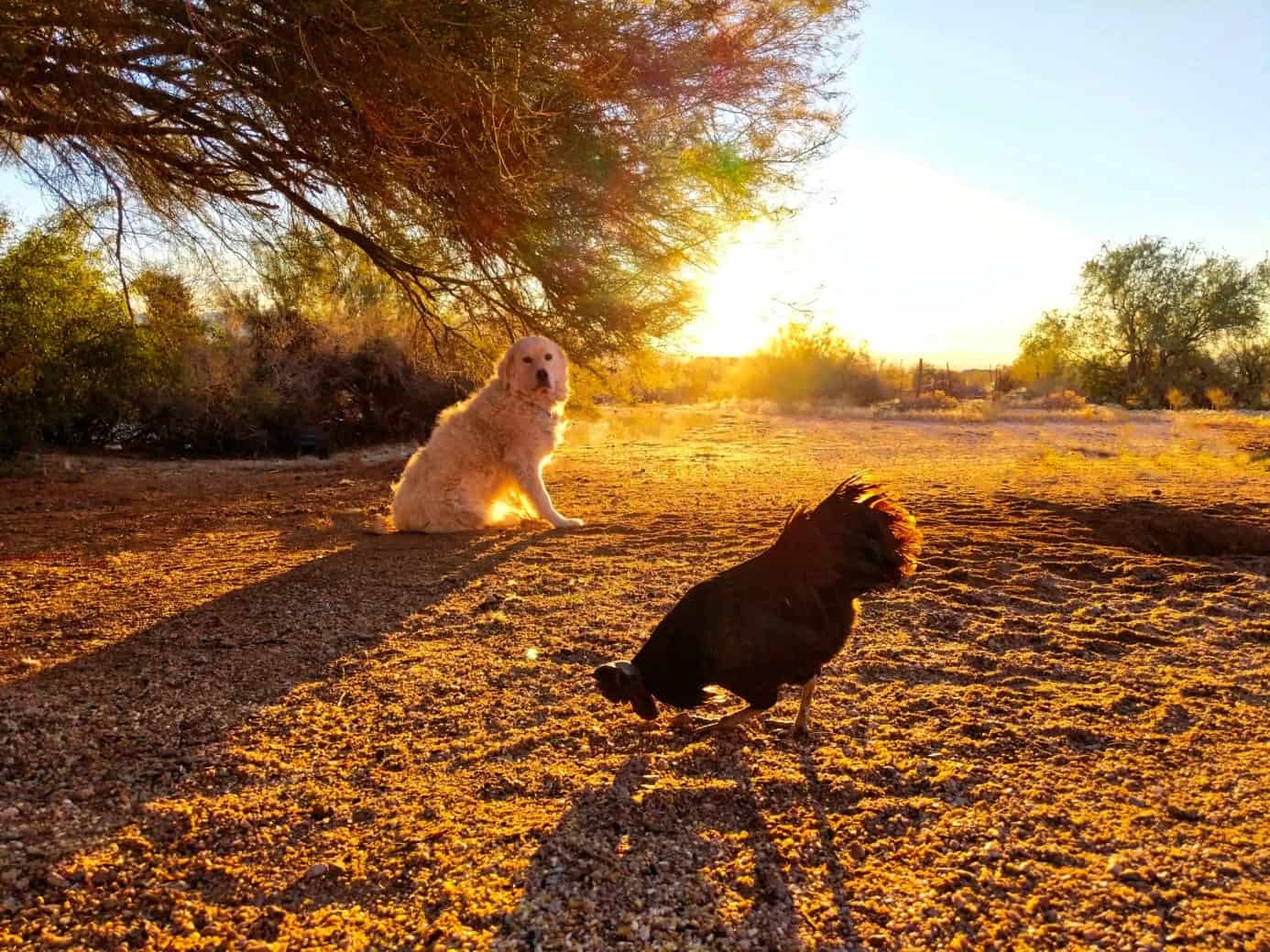




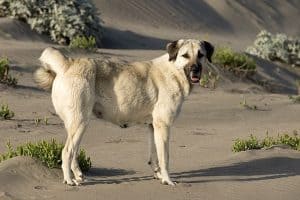


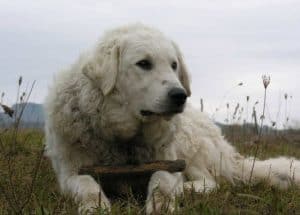

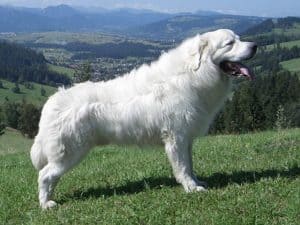








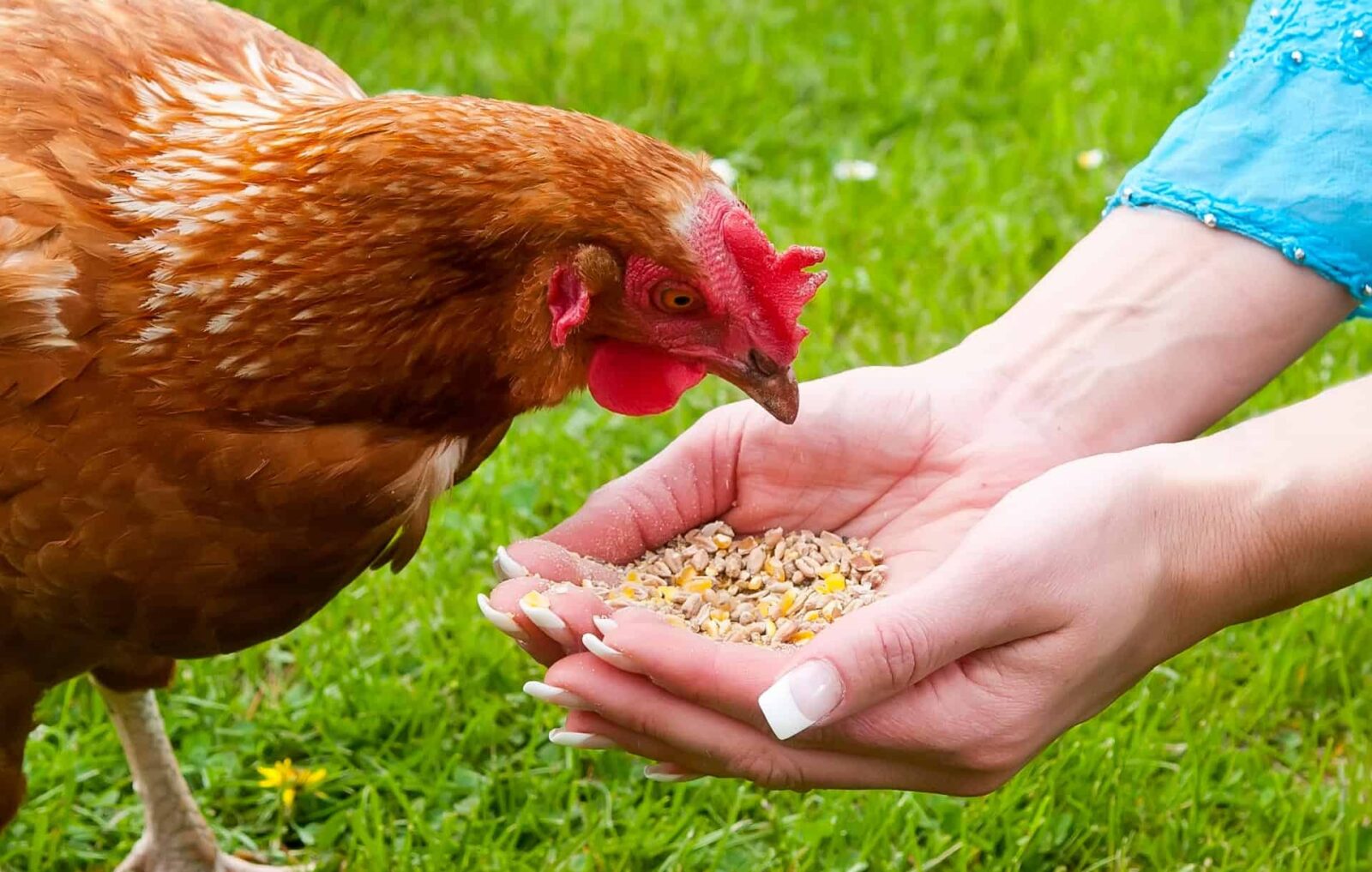
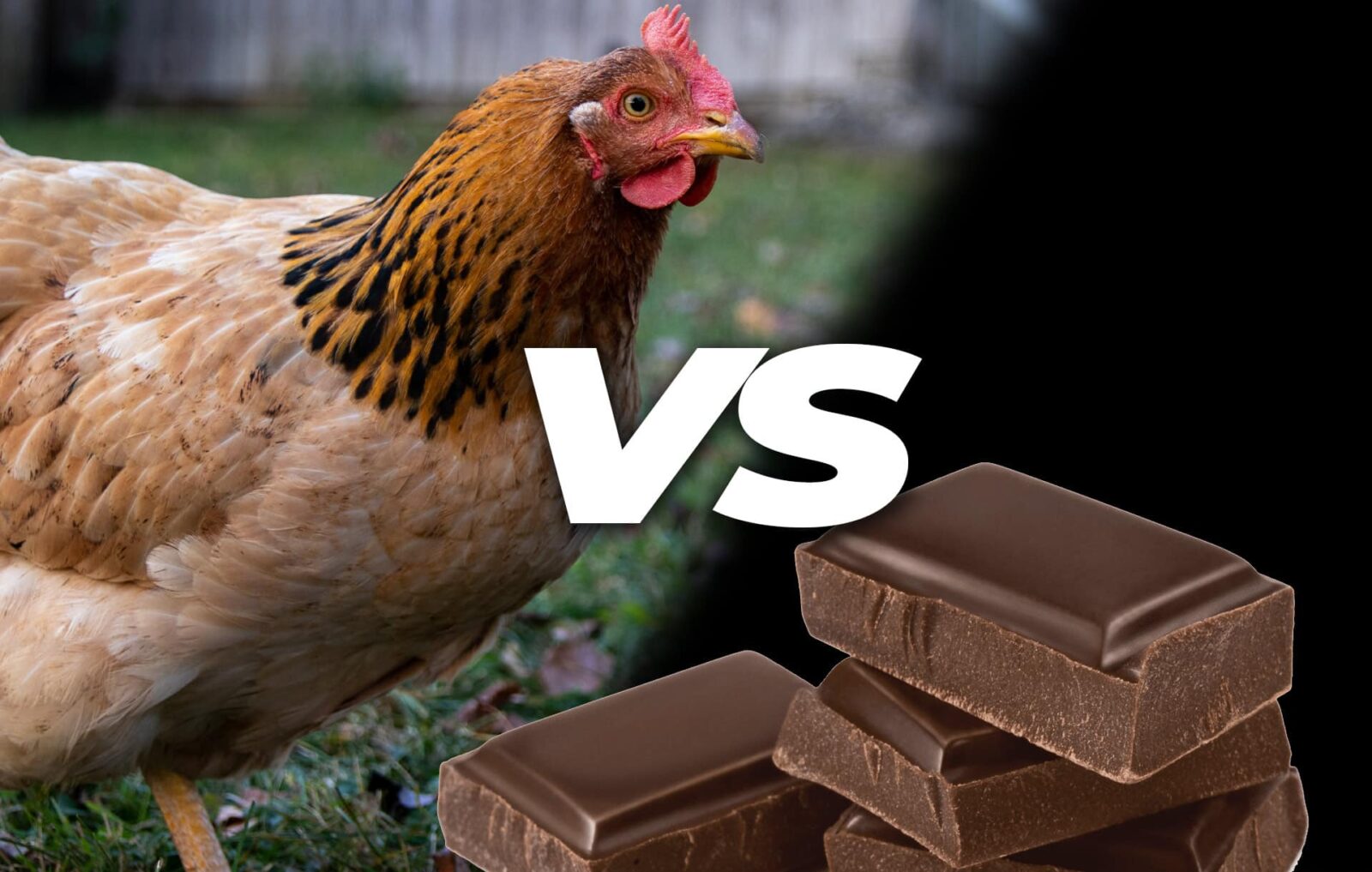

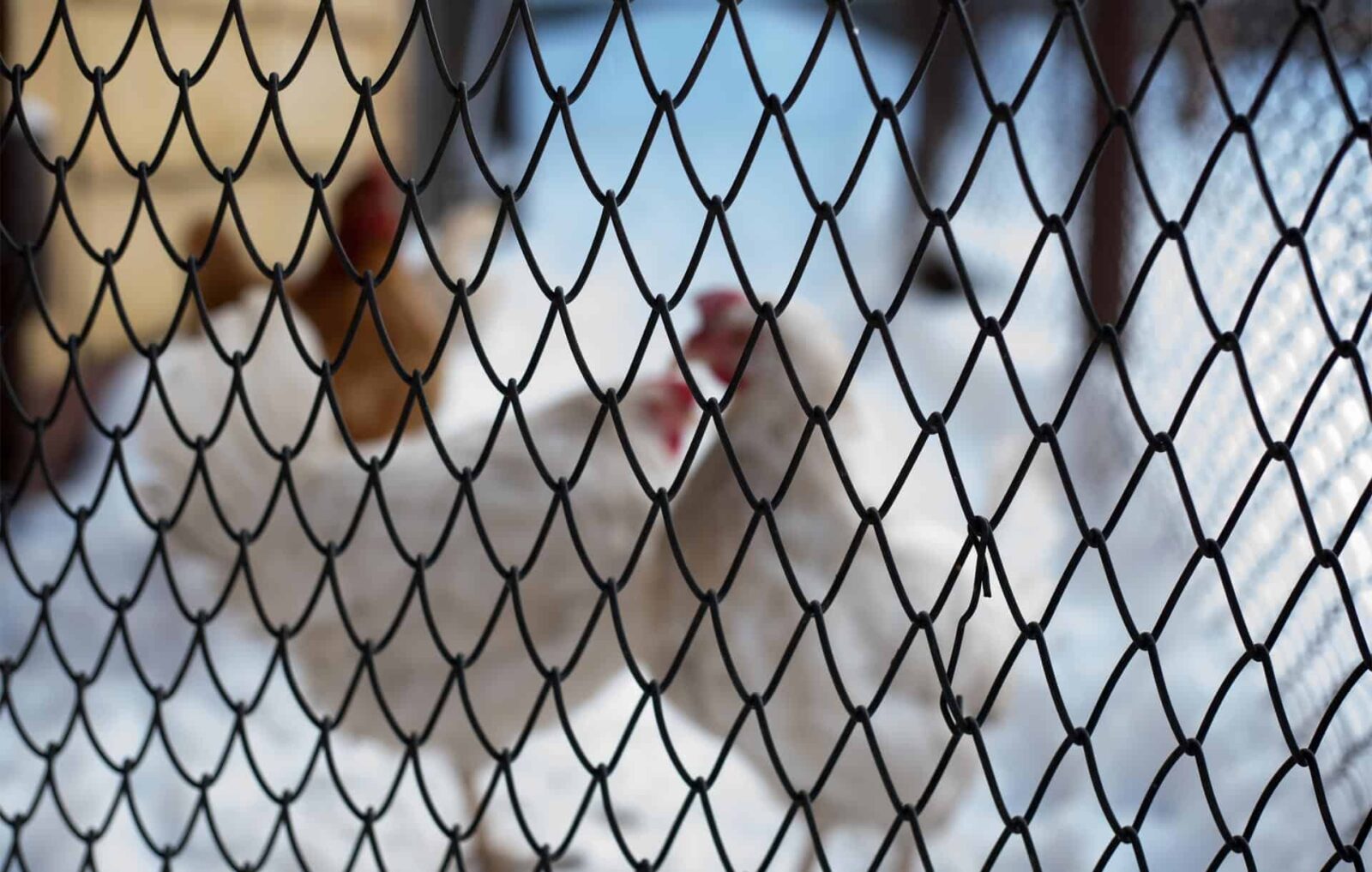


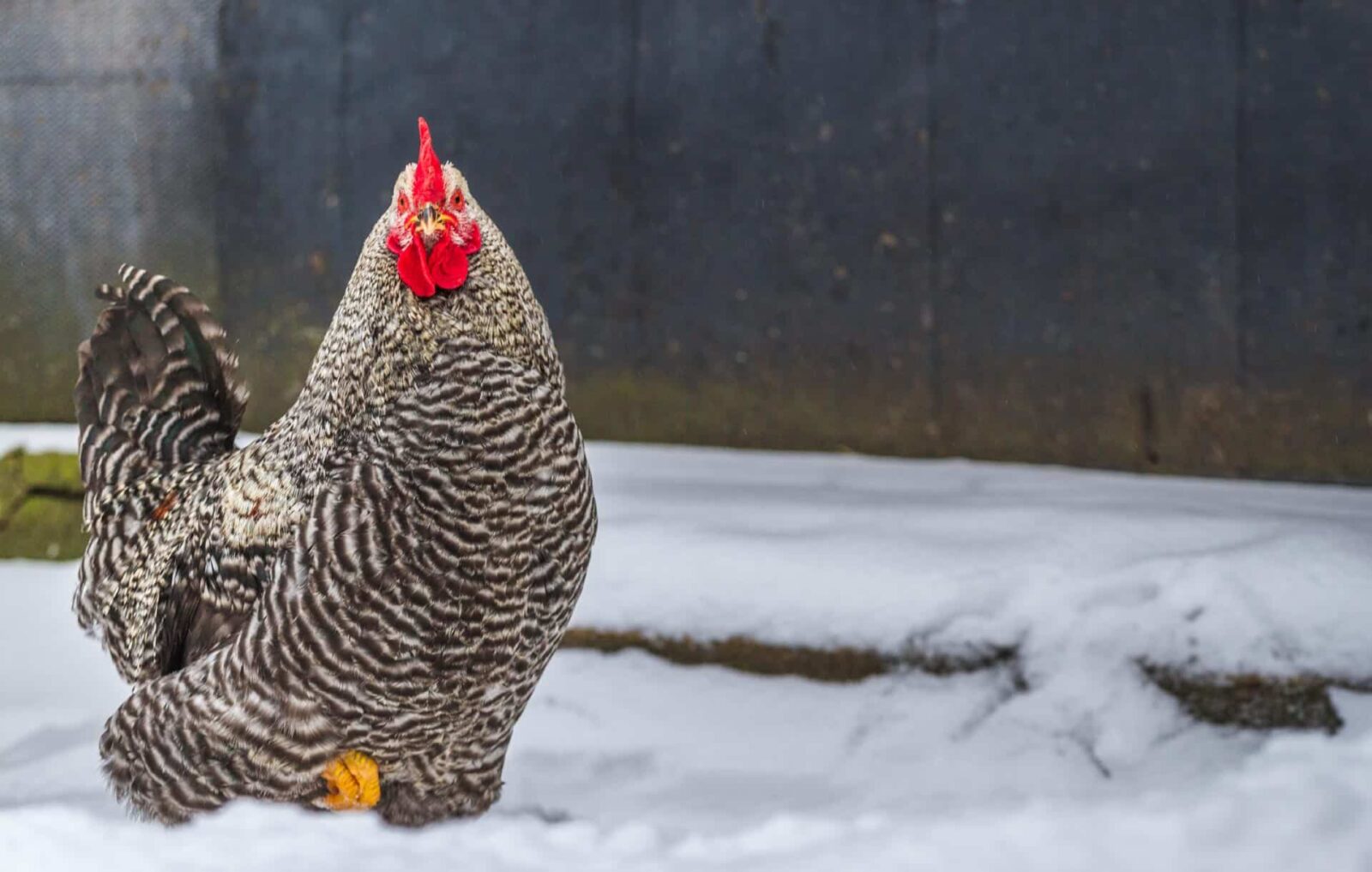

Comment (1)
Great pyrenees is certainly not a North American breed, the Pyrenees are in Europe, the dog has its origins in Spain and France